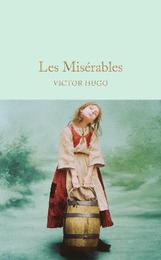
|
Les Miserables
Hardback
Main Details
| Title |
Les Miserables
|
| Authors and Contributors |
By (author) Victor Hugo
|
|
Introduction by Paul Bailey
|
| Series | Macmillan Collector's Library |
|---|
| Physical Properties |
| Format:Hardback | | Pages:472 | | Dimensions(mm): Height 157,Width 103 |
|
| Category/Genre | Classic fiction (pre c 1945) |
|---|
| ISBN/Barcode |
9781909621497
|
| Classifications | Dewey:843.7 |
|---|
| Audience | |
|---|
|
Publishing Details |
| Publisher |
Pan Macmillan
|
| Imprint |
Macmillan Collector's Library
|
| Publication Date |
8 September 2016 |
| Publication Country |
United Kingdom
|
Description
Les Miserables is a magnificent, sweeping story of revolution, love and the will to survive set amidst the poverty stricken streets of nineteeth-century Paris. Escaped convict Jean Valjean turns his back on his criminal past to build his fortunes as an honest man. He takes in abandoned orphan Cosette and raises her as his own daughter. But Jean Valjean is unable to free himself from his previous life and is pursued to the end by ruthless policeman Javert. As Cosette grows up, young idealist Marius catches a glimpse of her and falls desperately in love. The fates of all the characters await them during the violent turmoil of the June Rebellion in 1832. Designed to appeal to the book lover, the Macmillan Collector's Library is a series of beautiful gift editions of much loved classic titles. Macmillan Collector's Library are books to love and treasure.
Author Biography
Victor Hugo (1802-1885) is one of the most well-regarded French writers of the nineteenth century. He was a poet, novelist and dramatist, and he is best remembered in English as the author of Notre-Dame de Paris (The Hunchback of Notre-Dame) (1831) and Les Miserables (1862). Hugo was born in Besancon, and became a pivotal figure of the Romantic movement in France, involved in both literature and politics. He founded the literary magazine Conservateur Litteraire in 1819, aged just seventeen, and turned his hand to writing political verse and drama after Louis-Philippe's accession to the throne in 1830. His literary output was curtailed following the death of his daughter in 1843, but he began a new novel as an outlet for his grief. Completed many years later, this novel became Hugo's most notable work, Les Miserables.
Reviews"Hugo's genius was for the creation of simple and recognizable myth. The huge success of "Les Miserables "as a didactic work on behalf of the poor and oppressed is due to his poetic and myth-enlarged view of human nature." V. S. Pritchett "It was Tolstoy who vindicated [Hugo's] early ambition by judging "Les Miserables "one of the world's great novels, if not the greatest [His] ability to present the extremes of experience 'as they are' is, in the end, Hugo's great gift." From the Introduction by Peter Washington"
|